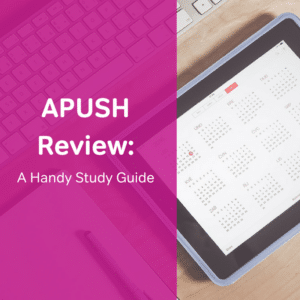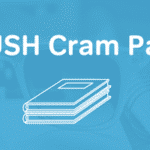The best way to be well-prepared for the AP US History exam is to keep up with the work throughout the whole school year. You should be doing your reading, keeping up with your assignments, studying each unit thoroughly as it comes, and reviewing old units periodically throughout the course. Once you get closer to test day, however, you may want to start studying more intensely. We’ve prepared a handy APUSH review plan to help you get ready for the big day!

APUSH Review Throughout the Year
So you’re planning ahead and want to keep up with your studying throughout the course? Awesome! This is the best way to go. Kaplan has a monthly and quarterly study plan to make sure you’re staying on track as new content is added.
As each new unit is added, it’s a good idea to:
- Keep or create a concept outline of just the most important ideas of the unit. If you have unit or chapter outlines from your class, great! Use them. There are also tons of great APUSH outlines online. Some of them align to specific textbooks, while others are more broadly-based.
- Make flashcards covering key vocabulary, people, and events and review them frequently. Flashcards are free and easy to make, and they are a great tool because they’re so simple and versatile to use. Get a parent, sibling, or friend to quiz you, or just quiz yourself. If you like a hands-on experience, you can make index card flashcards. You can also use an app to make digital flashcards on your phone.
Either way, flashcards are a tool you can carry around in your pocket or bag and pull out any time. Riding the bus? Brush up on your New Deal programs with all their pesky acronyms. Waiting around for soccer practice to start? What a great time to review the colonial tax laws!
Flashcards make it easy to squeeze in a few minutes of studying anytime, anywhere. This kind of small, frequent studying helps keep the information fresh so you’ll be less likely to need to cram later on.
- Do practice questions which mimic the real exam, and are relevant to the unit you’re studying.
In addition to keeping up with the current work your teacher assigns you, it’s a good idea to review old material all year long so you don’t forget it by the time May comes around. If your teacher gives cumulative unit tests (meaning they cover the current unit plus everything that came before), studying for these will help make sure that even the old material stays fresh. If, however, your teacher gives unit tests that are NOT cumulative (meaning they only cover the material from the current unit), then you’ll need to do cumulative review on your own. At a minimum, right after you’ve taken your unit test (so you can concentrate on studying for that test) but before you dive deep into the new unit, use that window for review of old material. Break out the flashcards, take some practice questions, and take note of your areas of weakness so you can give them more attention.
APUSH Review If You Have Three Months
You’ve made it through the holidays and through midterms, and now it’s time to buckle down and think about the AP exam. If you have three months for APUSH review before test day, here’s what you should plan to cover each week:
Week 1: Prepare to Review + Period 1 (1491-1607)
First off, spend a couple of days preparing to review. This may not sound like much, but it’s super important. This is the time to gather your materials and perform a self-assessment to see where you need to focus. This week, you should:
- Review the APUSH themes and historical thinking skills that you’ll need to know for the test. Think about which ones you’re confident in and which ones need more work.
- Take a practice test. As you review the results, take careful note of what you got right and wrong. Keep a tally of the units that your missed questions came from. Notice any patterns? Which units need the most review? Is there a specific type of question you keep getting wrong? Are you strong on multiple choice but your DBQs need work? Take stock of where you are so you know where you need to go in the next 11 weeks.
- Make flashcards if you haven’t already. Have these ready to go when it comes time to review each unit.
- Gather your resources. Pull together whatever review books, outlines, videos, games, practice questions, or other resources you plan on using. Get them in one place. Bookmark websites you plan to come back to. Spend this time figuring out what resources you want to use so that you can spend your time in the upcoming weeks actually using them.
Next, start your review with Period 1, which covers everything that came before the British founded the 13 colonies. We’re only devoting part of the first week to this period because it is only worth 5% of the exam.
Weeks 2-5: Review Periods 2-5
Week 2: Period 2 (1607-1754)
Week 3: Period 3 (1754-1800)
Week 4: Period 4 (1800-1848)
Week 5: Period 5 (1844-1877)
Week 6: Combined Review of Periods 1-5
Take this week to go over everything you’ve covered so far.
Do at least one practice essay (or even better, one essay of each type). Here are some past essay questions relevant to these periods:
- DBQ on the Revolutionary Era (p. 7-11)
- LEQ on trans-Atlantic trade (#2 on p. 34)
- LEQ on the French and Indian War (#2 on p. 11)
- LEQ on the market revolution (#2 on p. 12)
- LEQ on the Mexican-American War (#3 on p. 11)
Weeks 7-10: Review Periods 6-9
Week 7: Period 6 (1865-1898)
Week 8: Period 7 (1890-1945)
Week 9: Period 8 (1945-1980)
Week 10: Period 9 (1980-present)
Week 11: Combined Review of Periods 6-9
Take this week to go over everything you’ve covered in the last month of review.
Do at least one practice essay (or even better, one essay of each type). Here are some past essay questions relevant to these periods:
- DBQ on imperialism (p. 29-32)
- DBQ on the Women’s Rights Movement (p. 6-11)
- DBQ on New Conservatism (p. 6-10)
- LEQ on the 14th and 15th Amendments (#2 on p. 12)
- LEQ on technology and industrialization (#3 on p. 34)
- LEQ on World War I (#3 on p. 12)
- LEQ on the 19th Amendment (#3 on p. 12)
- LEQ on globalization (#4 on p. 34)
Week 12: Complete APUSH Review
Perform a quick cumulative review of the entire course. This is also a good time to take another practice test in preparation for exam day.
APUSH Review If You Have Two Months
Ok, so you weren’t quite on top of things enough to follow the 3-month schedule, but that’s ok. You’ve still got two months left to get in a great APUSH review. Here’s how to divide your time.
Week 1: Take a practice test, gather materials, and study Period 1
Week 2: Periods 2 and 3
Week 3: Periods 4 and 5
Week 4: Review Periods 1-5
Week 5: Periods 6 and 7
Week 6: Periods 8 and 9
Week 7: Review Periods 6-9
Week 8: Final review of the whole course
APUSH Review If You Have One Month
If you’ve waited until a month before the test to buckle down, here’s how to divide your time to make sure you stay on track and cover everything:
Week 1: Periods 1-3
Week 2: Periods 4-6
Week 3: Periods 5-9
Week 4: Final review of the whole course
If you’re looking for a very prescribed day-to-day plan, Albert has a nice one-month plan as well.
APUSH Review If You Have One Week
Cutting it a little close, are we? When you’ve only got a week left, there’s still a lot you can do to prepare for the exam. Check out our in-depth article on what to do when you’ve got one week left for APUSH review.
This is also a great time for a crash course. Check out our list of some of the best video and text-based crash courses to help you get the most out of your speedy APUSH review.
No matter when you decide to begin your APUSH review, we hope you find these tips and resources helpful. Let us know what you think, and happy studying!



